 W
WAlwan Al-Abousi is a retired Iraqi Air Force Major General. He was born in Basra, Iraq and attended to join the Iraqi Air Force Academy in 1961 and was commissioned as a MiG-17 fighter pilot in 1965. He graduated with a B.Sc in Aviation Science from the Egyptian Air Force Academy in 1970. Subsequently, he received an MA in military science from the Iraqi Staff College at Al-Bakr University. His foreign military training includes training in Egypt, India, Russia, France, and Greece. During the Iran–Iraq War, he served as commander of multiple squadrons, groups, and air bases. Late in the war, he became the director and deputy commander of air force training. In the early 1990s, General Abousi became the dean of the national defense for higher political and military studies, and later the commander of air force administration.
 W
WHossam Mohammed Amin was an Iraqi general under Saddam Hussein's government. He said in 2002 that Iraq would submit a list of chemical, biological and nuclear programs to UNMOVIC, but that the report would not disclose any banned weapons, "because, really, we have no weapons of mass destruction."
 W
WFadhil Jamil al-Barwari was an Iraqi military commander who was the head of the Iraqi Counter Terrorism Bureau.
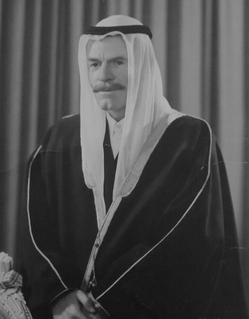 W
WIzzat Ibrahim al-Douri is an Iraqi politician and former Army Field Marshal. He served as Vice Chairman of the Iraqi Revolutionary Command Council until the 2003 U.S.-led invasion of Iraq and was regarded as the closest advisor and deputy under former President Saddam Hussein. He leads the Iraqi insurgent Naqshbandi Army.
 W
WSaber Abdel Aziz al-Douri is a former Iraqi politician, intelligence officer and Governor of Bagdad.
 W
WLt. General Sabah al-Fatlawi is an Iraqi military commander. He is currently the Chief Commander of the Samarra Special Forces Command.
 W
WLt. General Mohan al-Furayji is a general in the Iraqi Army. From September 2007 to April 2008, he was the commander of the Basra Operational Command, an Iraqi Army formation in control of all Iraqi Army forces in southern Iraq. In April 2008, he was assigned back to Baghdad.
 W
WLt. General Mahdi Sabeh Al-Gharawi is an Iraq police officer, the former Commander of the Iraqi Federal Police in Ninewa Province, and Lieutenant General of Iraqi Army.
 W
WTahir Jalil Habbush al Takriti is a former Iraqi intelligence official who served under the regime of Saddam Hussein; in 2001, he was Iraq's head of intelligence and as such, informed MI6 in January 2003 that Iraq had no WMD. He was the Jack of Diamonds in the most-wanted Iraqi playing cards and is still a fugitive with up to $1 million reward for information leading to his capture.
 W
WRa'ad Majid Rashid al-Hamdani was a General of the Iraqi Republican Guard, and was one of Saddam Hussein's favourite officers.
 W
WNassir Ahmad Ghanim Al-Ogali is a Major General in the Iraqi Army. He was the former commanding General of Muthanna 3rd Brigade, 6th Division, Iraqi Army. He is currently the commander of 2nd Division, Iraqi Army.
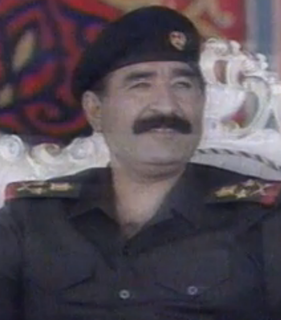 W
WHussein Kamel Hassan al-Majid was the son-in-law and second cousin of Iraqi leader Saddam Hussein. He defected to Jordan and assisted United Nations Special Commission (UNSCOM) and International Atomic Energy Agency (IAEA) inspection teams assigned to look for weapons of mass destruction in Iraq.
 W
WAdnan Khairallah was Saddam Hussein's brother-in-law and cousin. He held several titles and was a member of the Iraqi Revolutionary Command Council. He also served as the Defence Minister of Iraq from 1979 to his death, having been appointed days after Saddam Hussein succeeded to the Presidency. He died in 1989 in a helicopter crash that was officially labeled an accident. The circumstances surrounding his death, including his disputes with Saddam and rumors of a potential coup have led some to believe Khairallah was assassinated under orders from Saddam.
 W
WLieutenant General Abid Al-Hamid Mahmud al-Tikriti was an Iraqi military officer under Saddam Hussein's deposed government.
 W
WLt. General Ali Ghaidan Majid was the commander of the Iraqi Army between 2006 and September 2014.He is from the Balad Ruz area of Diyala province, Iraq. He served in the Iraqi Army during the regime of Saddam Hussein, but like a number of other generals, was imprisoned by Saddam following the Gulf War.
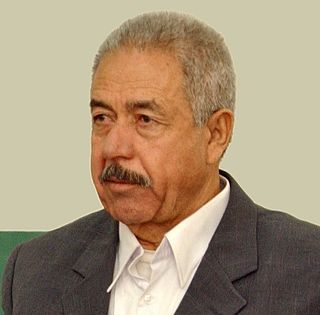 W
WAli Hassan Abd al-Majid al-Tikriti was a Ba'athist Iraqi Defence Minister, Interior Minister, military commander, chief of the Iraqi Intelligence Service and war criminal. He was also the governor of Kuwait during much of the 1990-91 Gulf War.
 W
WGeneral. Abdulqadir Mohammed Jassim Al-Mafraji' commonly known as Abdulqader Alobaidi was the 31st Defence Minister of Iraq in the Council of Ministers of Prime Minister Nouri al-Maliki from June 2006 to December 2010.
 W
WAbboud Qanbar(Arabic: عبود قنبر), also known as Abu Haidar, is an Iraqi General. On January 13, 2007, he was appointed by Prime Minister Nouri Maliki as the Iraqi commander for the Baghdad Operations Command, which controlled all Iraqi security forces in Baghdad and was charged with securing the capital. His Chief of Staff is Major General Hassan, and his Chief of Plans is Staff Colonel Abd Alamir. He hails from Amarah, a city in Southern Iraq.
 W
WAbd al-Karim Qasim Muhammad Bakr al-Fadhli al-Zubaidi was an Iraqi Army brigadier and nationalist who ascended into power when the Iraqi monarchy was overthrown during the 14 July Revolution. He ruled the country as the 24th Prime Minister until his downfall and execution during the 1963 Ramadan Revolution.
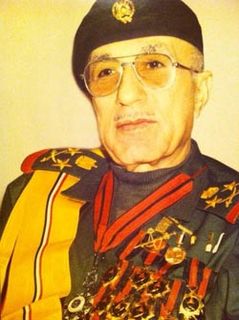 W
WHussein Rashid Mohammed al-Tikriti is a former Iraqi military commander, who formerly served as the General Secretary of the General Command of the Armed Forces of Iraq.
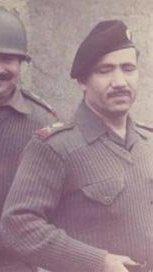 W
WMaher Abd al-Rashid was a General of the Iraqi army and a member of the Al-Bu Nasir tribe. Rashid rose to prominence during the Iran-Iraq war, and was regarded as one of Saddam's best generals, serving as Chief-of-Staff of the Iraqis after being brought out of retirement, which he had been forced into in 1983. Rashid also played a prominent role in helping Iraq to regain her initiative during the war. Not all assessments of Rashid were so kind, and Ra'ad al-Hamdani refers to him as "one of the dumbest generals in the army".
 W
WAyad Futayyih Khalifa al-Rawi was an Iraqi general of the Iraqi Republican Guard, and later served as the head of the Jerusalem Army. He started his service in the Army as an officer in an armoured unit, later fighting in the Iran–Iraq War, receiving numerous medals and suffering a severe head wound whilst leading an Iraqi counterattack against an Iranian offensive. In total Rawi was awarded 27 medals during the Iran–Iraq War. He was perceived to be a staunch Saddam loyalist.
 W
WAmir Hamudi Hasan al-Saadi or Amer al-Sadi, "the organizational genius behind the Iraqi superweapons program," was Saddam Hussein's liaison with the UN inspectors in the runup to the 2003 invasion of Iraq. Like the defector Hussein Kamel al-Majid, he insisted Iraq had destroyed its prohibited weapons. While he was dismissed by the US as a liar, he was vindicated by the subsequent failure to uncover weapons of mass destruction by the Iraqi Survey Group.
 W
WWafiq al-Samarrai is an Iraqi general formerly chief of Iraqi general military intelligence born in the region of Samarra.
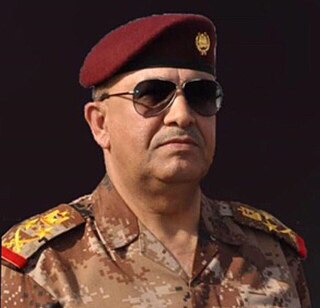 W
WTalib Shaghati Mosharry Alkinani(Arabic: طالب شغاتي), is an Iraqi General and Head of the Iraqi Special Operations Forces. He graduated from the Military College Course (49) in 1970, graduated from the College Leadership Course (7), graduated from the Staff College Course (50). After graduating from the military college he worked in the field artillery category and then participated in the basic missile course in 1971 in the Soviet Union and became a class of air defense / missiles. He worked in the air defense units and in the series of positions until he reached the commander of the air defense brigade, then the dean of the air defense institute and finally the dean of the air defense college and the rank of air defense brigade in 2001. Participated in the course of the leaders of fire brigades air defense in the Arab Republic of Egypt in 1983 and completed all courses of the basic category specialist.
 W
WNajah Hassan Ali al-Shammari is an Iraqi politician and military officer who served as the Minister of Defense from June 2019 to May 2020. He holds Swedish citizenship.
 W
WBakr Sidqi al-Askari was an Iraqi general of Kurdish origin, born in 1890 in Kirkuk and assassinated on August 12, 1937, at Mosul.
 W
WSulṭān Hāshim Aḥmad Muḥammad al-Ṭāʾī was an Iraqi military commander, who served as Minister of Defense under Saddam Hussein's regime. Considered one of Iraq's most competent military commanders, he was appointed to the position in 1995. During his thirty-year military career, Sultan commanded two brigades, three divisions, and two corps of regular army corps before assuming responsibilities as Minister of Defense.
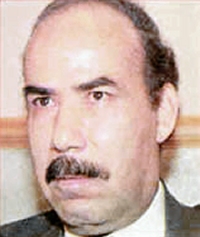 W
WBarzan Ibrahim Hassan al-Tikriti, also known as Barazan Ibrahim al-Tikriti, Barasan Ibrahem Alhassen and Barzan Hassan, was one of three half-brothers of Saddam Hussein, and a leader of the Mukhabarat, the Iraqi intelligence service. Despite falling out of favour with Saddam at one time, he was believed to have been a close presidential adviser at the time of his capture. On 15 January 2007, he was hanged for crimes against humanity. The rope decapitated him because wrong measurements were used in relation to how far he was dropped from the platform.
 W
WAyad Khalil Zaki was an Iraqi Army General. A career Combat engineering officer, he later served as the Governor of Muthanna Province after retiring from military service.
 W
WBabaker Baderkhan Shawkat Zebari is a former Kurdish KDP politician and retired General in the Iraqi Army. Zebari was chief of staff of the Iraqi army from 2004 till 2015.